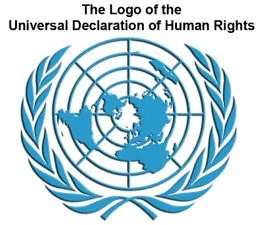The Universal Declaration of Human Rights
The Universal Declaration of Human Rights. World War II, severe repercussions for the world. After the world war, the world experienced the destruction and sacrifice millions of the human race, and the results of human culture are priceless.
All this is the result of countries that does not appreciate the human rights that have been fought over the centuries. Then considered necessary by the countries that won the war to give a strong foundation for human rights remained respected.
After the founding of the UNITED NATIONS then one of the specialized agencies, namely the Economic and Social Council (Ecosoc) or organizations Working for Social economics of the UNITED NATIONS in June 1946 was convened under the leadership of its Chairman, namely Ny. Eleanore Roosevelt (wife of the late United States President Roosevelt) to draw up a draft Charter of human rights.
 |
| The Logo image of the Universal Declaration of Human Rights |
The contents of The Universal Declaration of Human Rights
This draft has been accepted by the United Nations in the Council are generally in Paris on 10 December 1948 by the name of The Universal Declaration of Human Rights (World Declaration of human rights).
This statement is not an international treaty which is binding, but rather just a statement just to be able to give guidance to countries around the world to compose his Government each with not neglecting human rights and human freedom.
It consists of the preamble to the Declaration 30 articles which can be itemized
a. The rights of independence
b. Political rights
A. The rights of independence
1. The right of a person's independence
This guarantees the right of every human being will not get an arbitrary treatment from the Government or from others. The treatment of this form of government power:
- only on the basis of the provisions of the Act people can be detained, prosecuted and are convicted.
- people who violate the independence of a person liable to a criminal.
2. The rights of protection of property rights
Just for the benefit of the public the Government can take the goods belongs to a person accompanied by the payment of damages is regulated by law. Robber, thief or vandal is liable to a criminal.
3. The protection of rights of residence
Examination of the inside of the home residence of person must be based on a warrant from the Government. Enter the House of a person's residence without a permit is liable to a criminal.
4. Rights of freedom embraced religion
Free people embraced his chosen religion. Obstructing or disrupting those of worship is liable to a criminal.
5. The rights of protection of the secret letter
The Government took that post materials and transport of the State will not open letters that were submitted to him.
6. The rights issue the thoughts and feelings of
Everyone has the right to issue the mind and declare his feelings, either by oral or writing (press). The Government will act only when the word or text that violates the law, public order and decency.
7. The right of freedom of education and teaching
Everyone has the right to choose the kind of education and teaching in accordance with needs and his beliefs. Similarly, people are free to invite, establishing institutions of education and teaching in accordance with needs and his beliefs.
B. Political rights
Voting rights is necessary for the establishment of the people's representative bodies to decide the thrust of the Government.
- Passive suffrage: the right to choose to sit became a member of the people's representative body.
- Passive suffrage: the right to choose representatives who will sit in the representative body of the people.
The right to defend the country
Every citizen shall have the right (and required) to take part in maintaining the safety of the country against attacks from other countries or because of the rebellion.
The right to become civil servants
Everyone is entitled to the same terms to become civil servants.
